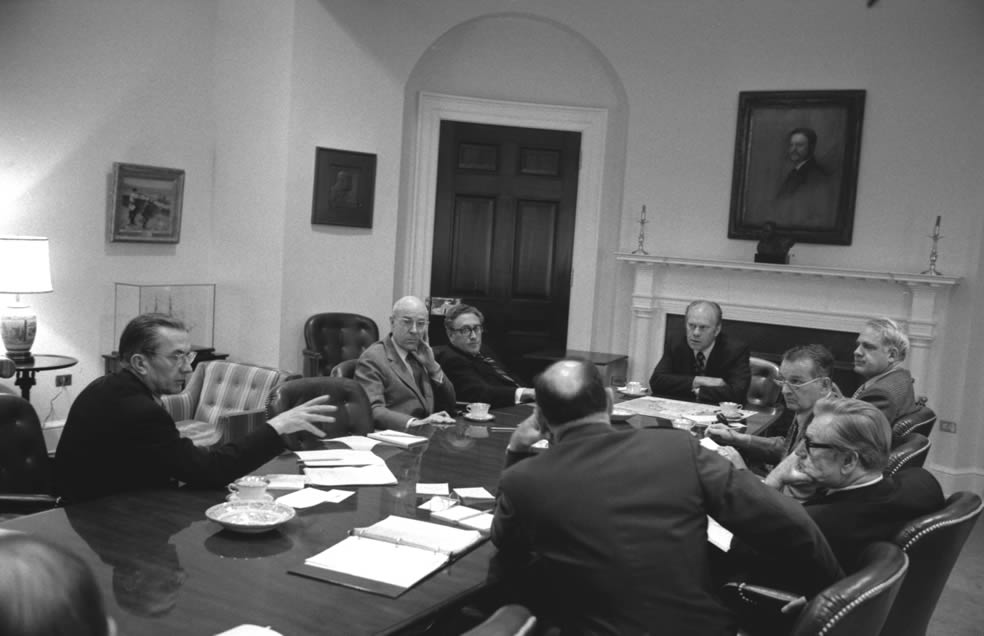DCI William Colby speaks during a National Security Council meeting on the situation on Vietnam. April 28, 1975. Clockwise, left to right, Colby; Robert S. Ingersoll, Deputy Secretary of State; Henry Kissinger, Secretary of State; President Ford: James Schlesinger, Defense Secretary; William Clements, Deputy Secretary of Defense; Vice President Nelson Rockefeller; General George S. Brown, Chairman of the Joint Chiefs of Staff; Lt. Gen. Brent Scowcroft, Deputy Assistant for National Security Affairs (lower left corner). Image A4234-11A ,http://www.fordlibrarymuseum.gov/avproj/vietnam.asp Gerald R. Ford Library, Ann Arbor, MI.
CIA director William Colby rebuffed criticisms from senior Agency operators about disclosure of CIA misdeeds by describing the difference between "bad secrets," "non-secrets," "good secrets" and "lesser" secrets, according to a previously SECRET internal CIA history of the Colby tenure, published today on the Web by the National Security Archive at George Washington University (www.nsarchive.org).
Colby responded in March 1974 to the head of the CIA's clandestine service, who claimed that any public discussion would "degrade the fabric of our security" and "lead inevitably to a further exposure of intelligence sources and methods," by writing:
"There are some 'bad secrets' which are properly revealed by an aggressive press. there are some older 'non-secrets' which no longer need to be kept secret and which we should gradually surface, but there are some 'good secrets' which deserve greater protection than we have been able to give them, in part by reason of their association with 'secrets' of lesser importance."
The latest declassification (in August 2011) from a series of secret studies by the CIA History Staff of the agency's directors, the volume gains credibility from its authorship by veteran CIA analyst and operative Harold Ford, who courageously presented to the Congress well-documented internal critiques of CIA director-designate Robert Gates during his confirmation hearings in 1991. To win confirmation, Gates had to promise Congress not to fire Ford in retaliation. The history, William Colby as Director of Central Intelligence, 1973-1976, provides detailed accounts of key episodes such as the firing of counterintelligence chief James Angleton, Colby's role in the revelation of the CIA "family jewels," and the collapse of South Vietnam, where Colby had spent much of his career.
The posting features an introduction and review written by Archive senior fellow John Prados, author of the widely-praised biography,
William Colby and the CIA: The Secret Wars of a Controversial Spymaster (University Press of Kansas, 2009). The favorable Prados review points out some shortcomings as well, including the history's lack of attention to Colby's fraught relationships with Presidents Nixon and Ford, and most of all, Henry Kissinger. Declassified Kissinger transcripts show Kissinger fuming about Colby's airing of the CIA's dirty laundry, but Prados concludes that Colby in effect saved the CIA from possible abolition as an agency.
From the film's
Web site: "A son's riveting look at a father whose life seemed straight out of a spy thriller . the story is at once a probing history of the CIA, a personal memoir of a family living in clandestine shadows, and an inquiry into the hard costs of a nation's most cloaked actions .. The film forges a fascinating mix of rare archival footage, never-before-seen photos, and interviews with the 'who's who' of American intelligence, including former National Security Advisers Brent Scowcroft and Zbigniew Brzezinski, former Secretary of Defense Donald Rumsfeld, former Secretary of Defense and Director of CIA James Schlesinger, as well PulitzerPrize journalists Bob Woodward, Seymour Hersh and Tim Weiner."


![NEOCASTRISMO [Hacer click en la imagen]](http://4.bp.blogspot.com/_5jy0SZhMlaU/SsuPVOlq2NI/AAAAAAAAH1E/4xt2Bwd2reE/S150/ppo+saturno+jugando+con+sus+hijos.jpg)






No hay comentarios:
Publicar un comentario